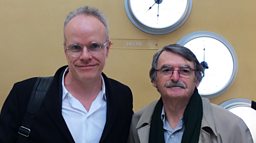In conversation: David Lodge and Hans Ulrich Obrist
3 February 2015
With his 1975 novel Changing Places, David Lodge made his name as the pre-eminent chronicler of campus life of our age. The 80-year-old author lays out the dilemmas and frustrations felt by a generation of post-war academics, delivered with his arch comic stylings.
Lodge’s books have a perch on the national consciousness like no others. His ‘campus trilogy’ of Changing Places, Small World and Nice Work are set in the fictional university town of Rummidge - a thinly veiled portrait of Birmingham. Ahead of the publication of his memoir Quite A Good Time To Be Born, the author spoke to art critic and curator Hans Ulrich Obrist at the city’s Deutsche Bank building.

Obrist: What are your early experiences of Birmingham and your feelings towards the city today?
Lodge: I came to Birmingham to work at the University. I began to write fiction about where I lived, and at first I was drawing some comic capital out of the very pejorative image that Birmingham has in British culture - particularly in the 1960s and 1970s. It was considered a rather dull, provincial city of rather philistine people.
I caricatured it in Changing Places and Small World. But the longer I lived here, the more affectionate I became towards the place and the more I understood how it worked. When I wrote Nice Work, although I used the same mythical version of Birmingham called Rummidge, it was a much more realistic and sympathetic portrait of the city. It was seen not just from the point of view of the cultured academic, but from somebody who was working in local industry at the time of great economic difficulty.
Since I wrote those novels, the city has changed again. It’s become a multicultural city, a more confident city and artistically a more productive city. It’s not so easy to sneer at Birmingham nowadays.
Obrist: Can you talk about that mixture of personal experience and fiction in Changing Places and Small World? Were there any specific literary references at play?
Lodge: If you’re writing about contemporary life and you want your audience to believe in the story, you almost inevitably draw on your personal experience and observation. I invented a fictional version of Birmingham in a similar way to many writers before me. Like Thomas Hardy’s Wessex or Arnold Bennett’s Five Towns, it was a fictional frame or disguise which indicated that this is fiction, this is not to be confused with reality.
Obrist: What is the future of Rummidge?
Lodge: I’m beginning to wonder if I’ve got another novel in me. I’d like to write one, whether it will include Rummidge or not. I’ve shown something of the change in Rummidge in my novels. In Therapy I describe some development taking place in the city centre, but it was written at a time in the early 90s when there was a kind of mini-depression going on. Then it seemed possible that many of the ambitious new buildings might never be occupied. But the economy and the city recovered, and I think the new city centre is on the whole a great success.
Obrist: Ecstasy and epiphany are two interesting concepts intertwined in your work. What do the terms mean to you today?
Lodge: Epiphany is a very literary term to me. It's used in literary criticism, but of course it’s religious in origin, referring to the showing of Jesus to the three wise men. In literary criticism it means a moment of intense excitement in the character whose consciousness is the centre of the story, at that point in which the commonplace seems illuminated and suddenly meaningful. James Joyce used the phrase - he put it into currency and it’s the moment when, ordinary, mundane reality is transformed into something eternal and transcendent and full of resonance and meaning.
There’s a scene in the end of Changing Places where the British writer is sitting outside a cafe in Berkeley, on Telegraph Avenue, watching all the people go by - the women in particular. He has a kind of epiphany in which he thinks that the whole cultural balance of the world has changed. In the past, people used to go to Europe for the Grand Tour for illumination, but now they’re coming to California and that’s where it’s happening, where it’s at. He has a sort of epiphany there and realises he doesn’t want to go back to his domestic suburban life in Rummidge.
Ecstasy is not a word I use a lot, I suppose because I don’t feel it a lot really. I don’t take the drug! I suppose I think of it as a physical sensation primarily, and I would associate it with eroticism and with sensual experiences like swimming in warm water while it’s snowing or something like that. Physical wellbeing in rather lovely circumstances is really what my idea of ecstasy is.
Since I wrote those novels, the city has changed again. It’s not so easy to sneer at BirminghamDavid Lodge
Obrist: What about the books you haven't written? Can you tell me about what planned novels you've had to set aside?
Lodge: There’s a temptation for writers to go on writing to prove to themselves that they’re still alive as it were. We’re all living longer, writers as well as everybody else. There’s a temptation to keep churning out books to affirm the fact that you exist. I don’t want to write a book just for that reason. I want to be seized with an idea that I know I will enjoy and bring to life. So far I haven’t had one, apart from my own autobiography which I’ve written one half of. My plan is to write the second half and if I am seized with another idea for a fiction, I would put it aside and do that.
I want to be seized with an idea that I know I will enjoy and bring to life
Obrist: Has the digital age changed the way you work, the way you research?
Lodge: Every writer has been affected by technological change. It’s made revision - which is really the heart of literary composition - physically effortless. In the old days I used to start by writing the whole book out by hand and then typing it up and changing it as I went along. If you got to the end of a page and thought that a word could be better you would have to retype the whole page again - so you'd just leave it. Now you can change it effortlessly.
You can access information at the click of a key that before would take you hours in a library. It’s made things easier but it’s threatening to undermine the whole economic, professional system by which books have been written and printed and produced and circulated and assessed and reviewed. It’s changing that completely. I’m rather glad that I’ve had most of my career in the in the older, more traditional bibliographical culture.
Obrist: Where do you stand on religion? Often great writers or artists start out as particularly orthodox and shift into agnosticism in later life, or vice versa - are either true for you?
Lodge: I’ve become more and more agnostic. I’ve lost the consolations of religion at the very time of life when most people would regard it as most valuable. Not that I wanted to. When I was young, being a Catholic in a nominally Protestant - but in fact secular - society, seemed to me an interesting and rather distinctive persona for a writer. The work of Graham Greene, Evelyn Waugh, and the Anglo-Catholic T.S.Eliot was very prestigious and a significant force in contemporary writing.
As I grew older, I became more interested in the Sea of Faith movement. It’s an Anglican movement, university based, who say that religion is a human construct. We created our god for moral and philosophical reasons. There is some value in going on with the rituals of religion, without necessarily subscribing literally to the beliefs. For a long time that satisfied me, but I no longer get much out of the actual act of religious worship. But I’m still very interested in religion and in some ways more interested than I ever was.
Obrist: What would be your advice to a young novelist?
Lodge: Read a lot of novels, because books are made out of other books. You learn by imitation and emulation and the variety you expose yourself to. But I would always say don’t expect your early work to be very good. It’s almost bound to be derivative. You have to be derivative before you can do something original.
Hans Ulrich Obrist is co-director at the Serpentine Gallery and author of The Interview Project. This article is an excerpt from an interview with Lodge at an exhibition by the Raqs Media Collective at Birmingham’s Deutsche Bank building in November 2014. It features an installation with a clock displaying ‘Rummidge time’ in tribute to Lodge’s creation.
David Lodge's Quite A Good Time To Be Born, A Memoir 1935–1975 will be launched at the Ikon Gallery in Birmingham on 10 February 2015.
Open Book
David Lodge talks to Mariella Frostrup on BBC Radio 4 about his Catholic faith, his long marriage and how his life and novels have overlapped.

-
![]()
Quite a Good Time to be Born
Read the first chapter of David Lodge's book Quite A Good Time To Be Born, A Memoir 1935–1975

